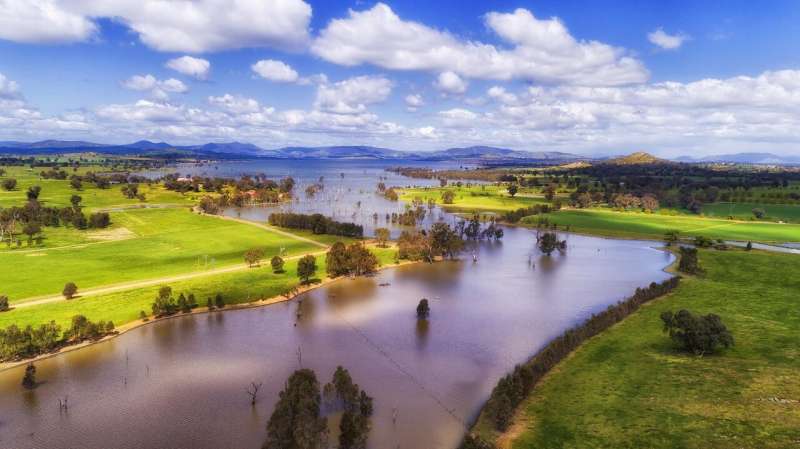Researchers debunk claims of water hoarding and speculative behavior in water markets

Researchers at the University of Adelaide have tested claims of water hoarding and speculative behavior in Murray-Darling Basin water markets and found no evidence of hoarding, or a clear source of speculative behavior, driving water price rises.
Water hoarding is a strategy to restrict supply, forcing prices up. Price speculation occurs when individuals can influence the market to trigger price rises and gains from trade.
In the research published in The Australian Journal of Agricultural and Resource Economics, the researchers combined three separate analysis techniques to test for hoarding and speculative behavior, including a benefit-cost assessment of trade gains for irrigation and external investment parties.
Lead author, Associate Professor Adam Loch from the University of Adelaide's Centre for Global Food and Resources said: "There are a lot of market myths out there right now but in our research we found no evidence of hoarding behavior in the market volume trends assessed and, therefore, dismissed hoarding as a driver of recent higher prices."
Associate Professor Loch says there is a long history of identifying and analyzing speculative bubbles in financial and stock markets but in water markets using those same approaches is challenging due to data limits, differences between water and financial assets, and a lack of clear signals to explain market volatility or severe price hikes.
"Market power is very difficult to assess and test given the unidentified nature of water allocation trades. There is evidence to suggest that some users may control around two percent of trade volumes when that water is available to them but that does not really provide a basis for market influence," said Associate Professor Loch.
"There is high likelihood of speculative behavior in Murray-Darling Basin water markets because the opportunity to make high profits in certain years is clearly apparent.
"But the claim that speculation is solely undertaken by external agents such as superannuation funds does not hold water. It is just as likely for an irrigator with lower total trade costs to be speculating and achieving significant gains in the market."
So why the recent price rises?
Co-author Dr. David Adamson, also from the University of Adelaide's Centre for Global Food and Resources, said: "We don't find any evidence of 'sinister forces' at play here. Low water supply during drought conditions and higher demand by perennial-crop irrigators who need water to keep their trees alive are more realistic recent price drivers.
"One outcome from these results is that any calls to regulate speculation in water markets would harm farming and irrigation market users.
"Regulating speculation in water markets is unlikely at any rate. It would be like trying to limit speculation in the housing or share markets."
The research has provided some much-needed insight into the market fundamentals underlying water trade, and supports early conclusions by a Victorian inquiry that greater water market trade transparency and data improvements go a long way to answering future concerns about market activity.
"In our view, in the absence of a central pricing and a true water stock market—similar to that of share trading—water brokers are best-placed to play buyers and sellers against one another for trade gain. This was raised a number of times in submissions to the ACCC inquiry," said Associate Professor Loch.
"If any regulation was to be introduced, attention on water broker trade behavior and transparency is where it would have the most impact."
The ACCC will release its final report from the Murray–Darling Basin (MDB) water markets inquiry in the coming months. A key focus for the ACCC was whether speculative behavior and/or the hoarding of water by some market users was driving higher than normal prices in the 2018-2020 period.
More information: Adam Loch et al. Markets, mis‐direction and motives: A factual analysis of hoarding and speculation in southern Murray–Darling Basin water markets*, Australian Journal of Agricultural and Resource Economics (2021). DOI: 10.1111/1467-8489.12419
Provided by University of Adelaide

















